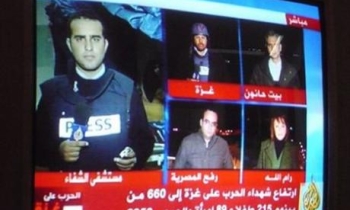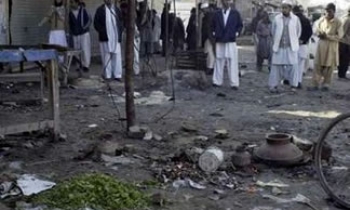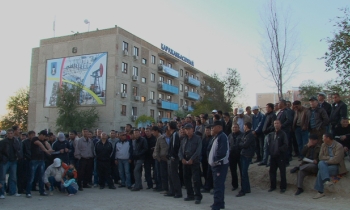Kabul – Afghanistan's top Islamic organization on Wednesday called for an end to violent protests over drawings of the Prophet Mohammed, as police shot four protesters to death to stop a crowd from marching on a U.S. military base in the southern part of the country.
"Islam says it's all right to demonstrate but not to resort to violence. This must stop," senior cleric Mohammed Usman told the Associated Press. "We condemn the cartoons but this does not justify violence. These rioters are defaming the name of Islam."
Other members of Afghanistan's Ulama Council went on radio and television Wednesday to appeal for calm.
Hundreds rioted outside the U.S. military base in the southern city of Qalat on Wednesday, throwing rocks at Afghan police. Police tried to clear the crowd by firing shots in the air, then were forced to fire into the crowd, said Ghulam Nabi Malakhail, the provincial police chief.
Four people were killed and at least 20 were wounded, he said.
The protesters then set fire to three fuel tankers that were waiting to deliver gas to the base, Chief Malakhail said. He said U.S. troops fired warning shots into the air.
A U.S. military spokesman, Lieutenant Mike Cody, said he had no details on the incident.
Eleven people have been killed in the past week as thousands have taken to the streets in a dozen Afghan cities and towns to march against the cartoons, which have been reprinted in various European media after first appearing in a Danish newspaper in September.
The drawings -- including one depicting the prophet wearing a turban shaped as a bomb -- have touched a raw nerve among Muslims. Islam is interpreted to forbid any illustrations of Mohammed for fear they could lead to idolatry.
Elsewhere on Wednesday, about 300 Palestinians attacked an international observer mission in the West Bank city of Hebron and tried to set one of the buildings on fire in a protest against the cartoons.
Sixty members of the mission were inside at the time, said Gunhild Forselv, a spokeswoman for the Temporary International Presence in Hebron, or TIPH, which serves as a buffer between Israeli settlers and Palestinians in the volatile city.
Eleven Danish members of TIPH left more than a week ago after protests against the cartoons began sweeping across the Muslim world, Ms. Forselv said.
The protesters chased away outnumbered Palestinian police stationed outside the mission, Ms. Forselv said.
But reinforcements were called in, and police took up position again, pushing back the protesters and regaining control of the situation. By that time, protesters had smashed nearly all of the windows in the mission's three-storey office building, and battered three TIPH cars. Israeli troops arrived at the site after the protest was subdued.
Indonesia's Foreign Minister said Wednesday that radical groups around the world were exploiting public anger over the cartoons. "The cartoons have hurt the Islamic community, so it has added to ammunition for [global] radical groups to exploit the situation and the whole thing has got out of proportion," Hassan Wirajuda told reporters.
The heads of the United Nations, European Union and the world's largest Islamic group issued a statement Tuesday also urging an end to the deadly protests.
"Aggression against life and property can only damage the image of a peaceful Islam," said the statement released jointly by Ekmeleddin Ihsanoglu of the Organization of the Islamic Conference, UN Secretary-General Kofi Annan and the EU chief Javier Solana.
In Copenhagen, Danish Prime Minister Anders Fogh Rasmussen showed no sign of diverting from his government's stance that it cannot apologize for the actions of an independent newspaper, as demanded by governments in several Muslim nations.
Mr. Fogh Rasmussen called the protests "a growing global crisis," as Iran suspended all trade and economic ties with Denmark.
The Afghan protests have involved armed men and have been directed at foreign and Afghan government targets -- fuelling suspicions there's more behind the unrest than religious sensitivities. Some senior Afghan officials have said they believe al-Qaeda and the Taliban could be behind much of the bloodshed.
"This is something that really upset Afghans," said Joanna Nathan, senior Afghanistan analyst at the International Crisis Group, a Brussels-based research institute. "But it is also being used to agitate and motivate the crowds by those against the government and foreign forces" in Afghanistan.
There were several other small protests across Afghanistan on Wednesday, including one in Kabul. Hundreds of university students, including women, marched peacefully through the capital, chanting "Death to the Danish! Death to Americans!"
More than 1,000 people also rallied Wednesday in Muslim-majority Bangladesh's capital, burning Danish and Italian flags. There were no immediate reports of violence.









